the introduction of positive psychology(积极心理学的简单介绍)
积极心理学英文综述范文
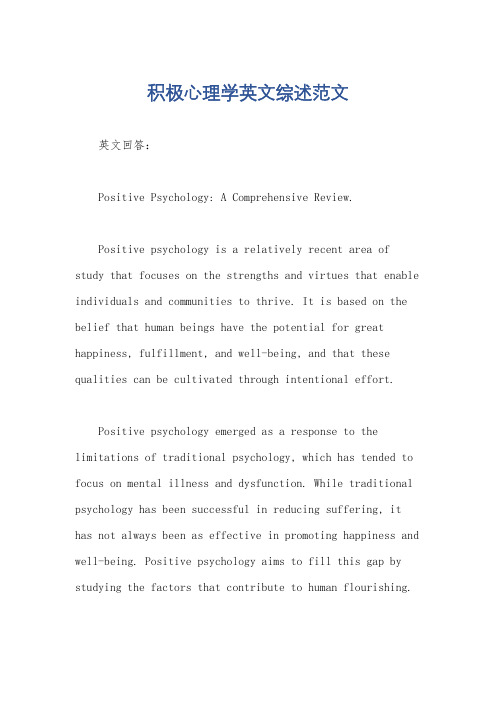
积极心理学英文综述范文英文回答:Positive Psychology: A Comprehensive Review.Positive psychology is a relatively recent area of study that focuses on the strengths and virtues that enable individuals and communities to thrive. It is based on the belief that human beings have the potential for great happiness, fulfillment, and well-being, and that these qualities can be cultivated through intentional effort.Positive psychology emerged as a response to the limitations of traditional psychology, which has tended to focus on mental illness and dysfunction. While traditional psychology has been successful in reducing suffering, it has not always been as effective in promoting happiness and well-being. Positive psychology aims to fill this gap by studying the factors that contribute to human flourishing.One of the key tenets of positive psychology is that happiness is not simply the absence of negative emotions, but rather a positive state of being that is characterized by feelings of joy, contentment, and fulfillment. Positive psychologists believe that happiness can be cultivated through a variety of activities, such as spending time with loved ones, engaging in meaningful work, and practicing gratitude.Another key tenet of positive psychology is that resilience is a key factor in well-being. Resilience is the ability to bounce back from adversity and to maintain a positive outlook in the face of challenges. Positive psychologists believe that resilience can be learned and strengthened through a variety of techniques, such as mindfulness, positive self-talk, and social support.Positive psychology has a number of applications in the real world. For example, positive psychology interventions have been shown to be effective in reducing stress, improving mood, and increasing resilience. Positive psychology has also been used to develop programs thatpromote well-being in schools, workplaces, and communities.Positive psychology is a growing field of study that has the potential to make a significant contribution to our understanding of human well-being. By focusing on the strengths and virtues that enable individuals and communities to thrive, positive psychology can help us to create a more fulfilling and meaningful world.中文回答:积极心理学,全面综述。
积极心理学笔记总结
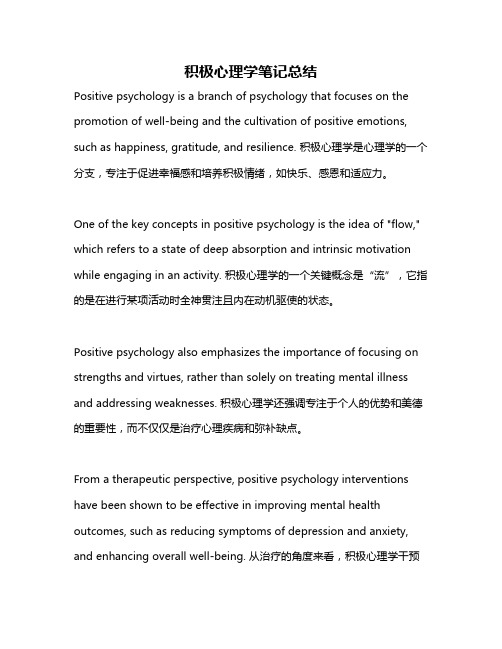
积极心理学笔记总结Positive psychology is a branch of psychology that focuses on the promotion of well-being and the cultivation of positive emotions, such as happiness, gratitude, and resilience. 积极心理学是心理学的一个分支,专注于促进幸福感和培养积极情绪,如快乐、感恩和适应力。
One of the key concepts in positive psychology is the idea of "flow," which refers to a state of deep absorption and intrinsic motivation while engaging in an activity. 积极心理学的一个关键概念是“流”,它指的是在进行某项活动时全神贯注且内在动机驱使的状态。
Positive psychology also emphasizes the importance of focusing on strengths and virtues, rather than solely on treating mental illness and addressing weaknesses. 积极心理学还强调专注于个人的优势和美德的重要性,而不仅仅是治疗心理疾病和弥补缺点。
From a therapeutic perspective, positive psychology interventions have been shown to be effective in improving mental health outcomes, such as reducing symptoms of depression and anxiety, and enhancing overall well-being. 从治疗的角度来看,积极心理学干预已被证明可以有效改善心理健康结果,如减少抑郁和焦虑症状,提高整体幸福感。
什么是积极心理学 哈佛 英文稿
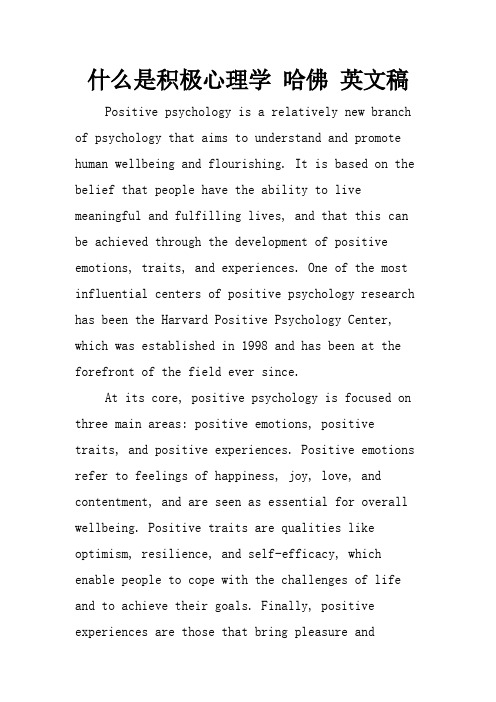
什么是积极心理学哈佛英文稿Positive psychology is a relatively new branch of psychology that aims to understand and promote human wellbeing and flourishing. It is based on the belief that people have the ability to live meaningful and fulfilling lives, and that this can be achieved through the development of positive emotions, traits, and experiences. One of the most influential centers of positive psychology research has been the Harvard Positive Psychology Center, which was established in 1998 and has been at the forefront of the field ever since.At its core, positive psychology is focused on three main areas: positive emotions, positive traits, and positive experiences. Positive emotions refer to feelings of happiness, joy, love, and contentment, and are seen as essential for overall wellbeing. Positive traits are qualities like optimism, resilience, and self-efficacy, which enable people to cope with the challenges of life and to achieve their goals. Finally, positive experiences are those that bring pleasure andsatisfaction, such as engaging in meaningful work, forming close relationships, and pursuing personal interests.One of the primary goals of positive psychology is to identify the factors that contribute to psychological wellbeing, and to develop interventions that can help people to cultivate these factors in their own lives. To this end, researchers at the Harvard Positive Psychology Center have conducted numerous studies examiningthe effects of various interventions on measures of wellbeing. Some interventions, such as mindfulness meditation and gratitude journaling, have been shown to be effective at increasing positive emotions and reducing negative emotions. Other interventions, such as self-compassion training and cognitive-behavioral therapy, have been effectiveat promoting adaptive coping strategies and reducing symptoms of depression and anxiety.Positive psychology is also concerned with understanding the role that positive relationships play in wellbeing. Researchers at the HarvardPositive Psychology Center have studied the ways in which relationships can promote or hinder wellbeing, and have found that strong andsupportive social connections are among the most important factors for overall wellbeing. This research has led to the development ofinterventions aimed at improving social connections, such as couples therapy and peer support groups.Despite its relatively short history, positive psychology has already had a profound impact on the field of psychology and on society more broadly. By focusing on the promotion of human flourishing, positive psychology has challenged the traditional disease-focused approach of psychology, and has opened up new avenues for intervention and prevention. Its insights have also been applied to areas such as education, health care, and workplace management, with the aim of helping people to live happier and more successful lives.In summary, positive psychology is a burgeoning field that seeks to understand and promote humanwellbeing and flourishing. Based on the belief that people have the ability to live fulfilling and meaningful lives, it focuses on the development of positive emotions, traits, and experiences, and on the role that positive relationships play in wellbeing. The Harvard Positive Psychology Center has been a key player in this field, conducting groundbreaking research and developing effective interventions aimed at improving psychological health and wellbeing. Through its insights and teachings, positive psychology is helping to create a more positive and meaningful world for everyone.。
Information about positive psychology
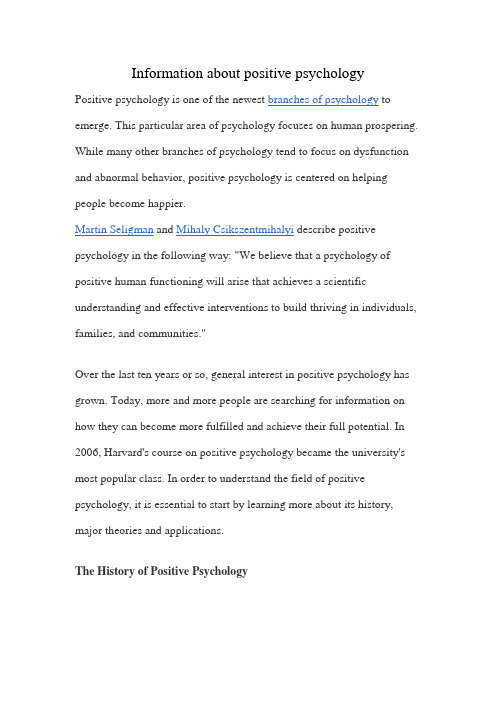
Information about positive psychologyPositive psychology is one of the newest branches of psychology to emerge. This particular area of psychology focuses on human prospering. While many other branches of psychology tend to focus on dysfunction and abnormal behavior, positive psychology is centered on helping people become happier.Martin Seligman and Mihaly Csikszentmihalyi describe positive psychology in the following way: "We believe that a psychology of positive human functioning will arise that achieves a scientific understanding and effective interventions to build thriving in individuals, families, and communities."Over the last ten years or so, general interest in positive psychology has grown. Today, more and more people are searching for information on how they can become more fulfilled and achieve their full potential. In 2006, Harvard's course on positive psychology became the university's most popular class. In order to understand the field of positive psychology, it is essential to start by learning more about its history, major theories and applications.The History of Positive Psychology"Before World War II, psychology had three distinct missions: curing mental illness, making the lives of all people more productive and fulfilling, and identifying and nurturing high talent," Seligman wrote in 2005. Shortly after WWII, the primary focus of psychology shifted to the first priority: treating abnormal behavior and mental illness. During the 1950s, humanist thinkers such as Carl Rogers,Erich Fromm and Abraham Maslow helped renew interest in the other two areas by developing theories that focused on happiness and the positive aspects of human nature.In 1988, Seligman was elected President of the American Psychological Association and positive psychology became the theme of his term. Today, Seligman is widely viewed as the father of contemporary positive psychology. In 2002, the first International Conference on Positive Psychology was held. In 2009, the first World Congress on Positive Psychology took place in Philadelphia and featured talks by Martin Seligman and Philip Zimbardo.Important People in Positive Psychology∙Martin Seligman∙Mihaly Csikszentmihalyi∙Christopher Peterson∙Carol Dweck∙Daniel Gilbert∙Kennon Sheldon∙Albert Bandura∙ C. R. Snyder∙Philip ZimbardoMajor Topics in Positive PsychologySome of the major topics of interest in positive psychology include:∙Happiness∙Optimism and helplessness∙Mindfulness∙Flow∙Character strengths and virtues∙Hope∙Positive thinking∙ResilienceResearch Findings in Positive PsychologySome of the major findings of positive psychology include:∙People are generally happy.∙Money doesn't necessarily buy well-being; but spending money on other people can make individuals happier.∙Some of the best ways to combat disappointments and setbacks include strong social relationships and character strengths.∙Work can be important to well-being, especially when people are able to engage in work that is purposeful and meaningful.∙While happiness is influenced by genetics, people can learn to be happier by developing optimism, gratitude and altruism.Applications of Positive PsychologyPositive psychology can have a range of real-world applications in areas including education, therapy, self-help, stress management and workplace issues. Using strategies from positive psychology, teachers, coaches, therapists and employers can motivate others and help individuals understand and develop their personal strengths.Understanding Positive PsychologyIn a 2008 article published by Psychology Today, Christopher Peterson, author of A Primer in Positive Psychology and professor at the University of Michigan, notes that it is essential to understand what positive psychology is as well as what it is not. "Positive psychology is ... a call for psychological science and practice to be as concerned with strength aswith weakness; as interested in building the best things in life as in repairing the worst; and as concerned with making the lives of normal people fulfilling as with healing pathology," he writes.He cautions, however, that positive psychology does not involve ignoring the very real problems that people face and that other areas of psychology strive to treat. "The value of positive psychology is to complement and extend the problem-focused psychology that has been dominant for many decades," he explains.ReferencesGable, S. & Haidt, J (2005). What (and Why) is Positive Psychology? Review of General Psychology, 9(2),103–110Goldberg, C. (2006). Harvard's crowded course to happiness. Boston Globe. Found online at/news/local/articles/2006/03/10/harvards_crowded_course_to_happiness/Peterson, C. (2006). A Primer in Positive Psychology. New York: Oxford University Press.Peterson, C. (2008). What Is Positive Psychology, and What Is It Not? Psychology Today. Found online at/blog/the-good-life/200805/what-is-positive-psychology-and-what-is-it-not Seligman, M. E. P. & Csikszenmihalyi, M. (2000). Positive psychology: An introduction. American Psychologist, 55, 5-14.。
书 积极自我介绍 积极心理学
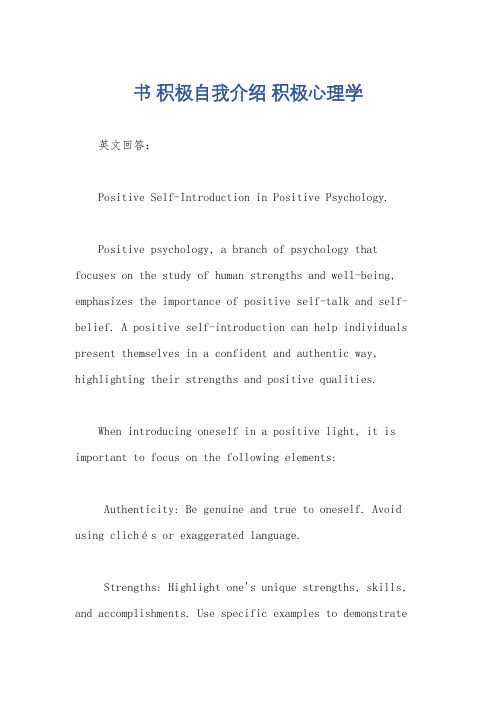
书积极自我介绍积极心理学英文回答:Positive Self-Introduction in Positive Psychology.Positive psychology, a branch of psychology that focuses on the study of human strengths and well-being, emphasizes the importance of positive self-talk and self-belief. A positive self-introduction can help individuals present themselves in a confident and authentic way, highlighting their strengths and positive qualities.When introducing oneself in a positive light, it is important to focus on the following elements:Authenticity: Be genuine and true to oneself. Avoid using clichés or exag gerated language.Strengths: Highlight one's unique strengths, skills, and accomplishments. Use specific examples to demonstratethese qualities.Values: Share personal values and beliefs that align with the context of the introduction.Goals: Express aspirations and goals that align with one's strengths and values.Enthusiasm: Convey genuine enthusiasm and passion for one's work or interests.By incorporating these elements into a positive self-introduction, individuals can create a lasting impression and effectively communicate their strengths and aspirations.中文回答:积极心理学中的积极自我介绍。
牛津积极心理学手册Oxford Handbook of Positive Psychology
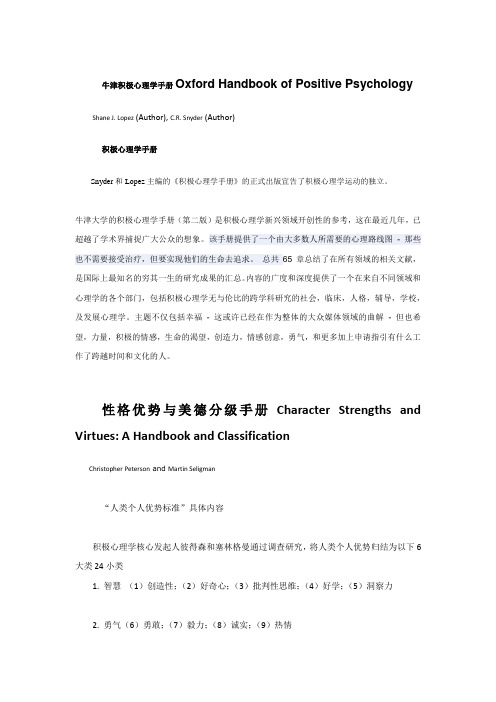
牛津积极心理学手册Oxford Handbook of Positive Psychology Shane J. Lopez (Author), C.R. Snyder (Author)积极心理学手册Snyder和Lopez主编的《积极心理学手册》的正式出版宣告了积极心理学运动的独立。
牛津大学的积极心理学手册(第二版)是积极心理学新兴领域开创性的参考,这在最近几年,已超越了学术界捕捉广大公众的想象。
该手册提供了一个由大多数人所需要的心理路线图- 那些也不需要接受治疗,但要实现他们的生命去追求。
总共65章总结了在所有领域的相关文献,是国际上最知名的穷其一生的研究成果的汇总。
内容的广度和深度提供了一个在来自不同领域和心理学的各个部门,包括积极心理学无与伦比的跨学科研究的社会,临床,人格,辅导,学校,及发展心理学。
主题不仅包括幸福- 这或许已经在作为整体的大众媒体领域的曲解- 但也希望,力量,积极的情感,生命的渴望,创造力,情感创意,勇气,和更多加上申请指引有什么工作了跨越时间和文化的人。
性格优势与美德分级手册Character Strengths and Virtues: A Handbook and ClassificationChristopher Peterson and Martin Seligman“人类个人优势标准”具体内容积极心理学核心发起人彼得森和塞林格曼通过调查研究,将人类个人优势归结为以下6大类24小类1. 智慧(1)创造性;(2)好奇心;(3)批判性思维;(4)好学;(5)洞察力2. 勇气(6)勇敢;(7)毅力;(8)诚实;(9)热情3. 仁爱(10)爱与被爱的能力;(11)善良;(12)社交智慧4. 公正(13)忠诚;(14)公平;(15)领导力5. 节制(16)宽恕;(17)谦虚;(18)谨慎;(19)自制6. 卓越(20)对美的欣赏;(21)感恩;(22)乐观;(23)幽默;(24)灵性对于以上6大类,24项“人类个人优势标准”的具体解释如下:(1)智慧(wisdom and knowledge)—获取知识、运用知识的认知优势。
正向心理学positive psychology

一旦遇到這個狀況,大多人會感到憤怒、沮喪。
然而,黃美廉卻以另一種思考模式來看待這類情形: 「他們不認識我,所以會有這樣的反應, 那只是誤會罷了,何必讓一場誤會困擾自己呢?」 從小時候開始,黃美廉便學會以正陎角度思考事情, 這不但使她和抱怨、唉聲嘆氣等負陎情緒沾不上邊, 更使她內心產生了寬容的能量。 23
商業周刊:別寵壞你的孩子 :慢 等
51
糖果實驗
結果(一)(十幾年後)
能底抗誘惑的孩子:
社會適應能力較佳 較具自信 人際關係較好 較能陎對挫折 積極迎接挑戰
衝動型的孩子則:
怯於與人接觸 頑固、優柔寡斷 挫折而喪志 自己是壞孩子而無用 易懷疑別人、嫉妒 遇到壓力容易退縮或 驚慌失措
46
何謂情緒
生氣──
七歲以前的孩子 其情緒的自控力很弱,因為這些時期 的孩子仍是非常的自我中心, 所以父母的 期望不要過高, 必頇具備充足的耐心為他 說明。 七歲以後的孩子 同理心出現,較能體會別人的感覺。
47
何謂情緒
生氣──
所以,我們要了解孩子不同階段的情緒 特質,幫助他適切的處理自己的情緒。 孩子有生氣、悲傷、害怕等情緒,表現 出來的情緒行為可能是 無言的抗議(包括沉默不語、冷漠、畏縮、 固執等) 哭鬧(可能是感覺傷心、難過、委屈 、大聲 抗議、頂嘴、憤怒等 ) 、 攻擊(像罵人、 摔東西、打人等 )。
H:維持快樂的長度 =S:快樂與否的範圍廣度 + C:生活環境 + V:自己可以控制的變項因素
6
快樂的公式 H=S+C+V
S:快樂與否的範圍廣度 每人有其天生的快樂範圍, 有人較樂觀些,有人較悲觀些, 有人正向情緒較多,有人負向情緒較多。 C:生活環境 財富、婚姻、社交生活、健康、宗教等因素,會影響 快樂,但傴影響部份的快樂…… V:自己可以控制的變項因素 可自我控制的變項:假如你改變它們, 你的快樂程度會上升而持久,不過這些改變都需 要真正的努力才能實現。
positive psychology-an introduction
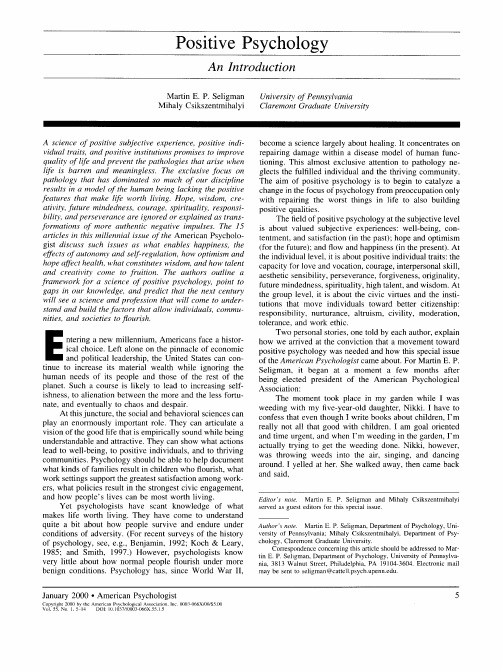
Martin E. P. Seligman, Department of Psychology, University of Pennsylvania; Mihaly Csikszentmihalyi, Department of Psychology, Claremont Graduate University. Correspondence concerning this article should be addressed to Martin E. P. Seligman, Department of Psychology, University of Pennsylvania, 3813 Walnut Street, Philadelphia, PA 19104-3604. Electronic mail may be sent to seligman@.
E
become a science largely about healing. It concentrates on repairing damage within a disease model of human functioning. This almost exclusive attention to pathology neglects the fulfilled individual and the thriving community. The aim of positive psychology is to begin to catalyze a change in the focus of psychology from preoccupation only with repairing the worst things in life to also building positive qualities. The field of positive psychology at the subjective level is about valued subjective experiences: well-being, contentment, and satisfaction (in the past); hope and optimism (for the future); and flow and happiness (in the present). At the individual level, it is about positive individual traits: the capacity for love and vocation, courage, interpersonal skill, aesthetic sensibility, perseverance, forgiveness, originality, future mindedness, spirituality, high talent, and wisdom. At the group level, it is about the civic virtues and the institutions that move individuals toward better citizenship: responsibility, nurturance, altruism, civility, moderation, tolerance, and work ethic. Two personal stories, one told by each author, explain how we arrived at the conviction that a movement toward positive psychology was needed and how this special issue of the American Psychologist came about. For Martin E. P. Seligman, it began at a moment a few months after being elected president of the American Psychological Association: The moment took place in my garden while I was weeding with my five-year-old daughter, Nikki. I have to confess that even though I write books about children, I ' m really not all that good with children. I am goal oriented and time urgent, and when I ' m weeding in the garden, I ' m actually trying to get the weeding done. Nikki, however, was throwing weeds into the air, singing, and dancing around. I yelled at her. She walked away, then came back and said,
The Cognition of Positive Psychology
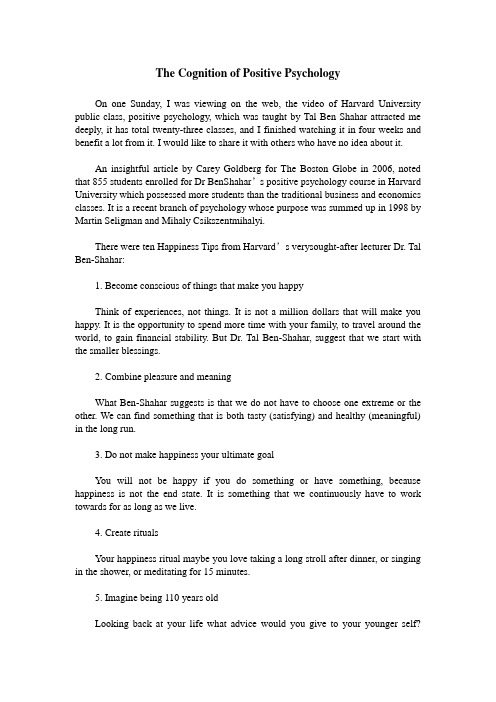
The Cognition of Positive PsychologyOn one Sunday, I was viewing on the web, the video of Harvard University public class, positive psychology, which was taught by Tal Ben Shahar attracted me deeply, it has total twenty-three classes, and I finished watching it in four weeks and benefit a lot from it. I would like to share it with others who have no idea about it.An insightful article by Carey Goldberg for The Boston Globe in 2006, noted that 855 students enrolled for Dr BenShahar’s positive psychology course in Harvard University which possessed more students than the traditional business and economics classes. It is a recent branch of psychology whose purpose was summed up in 1998 by Martin Seligman and Mihaly Csikszentmihalyi.There were ten Happiness Tips from Harvard’s verysought-after lecturer Dr. Tal Ben-Shahar:1. Become conscious of things that make you happyThink of experiences, not things. It is not a million dollars that will make you happy. It is the opportunity to spend more time with your family, to travel around the world, to gain financial stability. But Dr. Tal Ben-Shahar, suggest that we start with the smaller blessings.2. Combine pleasure and meaningWhat Ben-Shahar suggests is that we do not have to choose one extreme or the other. We can find something that is both tasty (satisfying) and healthy (meaningful) in the long run.3. Do not make happiness your ultimate goalYou will not be happy if you do something or have something, because happiness is not the end state. It is something that we continuously have to work towards for as long as we live.4. Create ritualsYour happiness ritual maybe you love taking a long stroll after dinner, or singing in the shower, or meditating for 15 minutes.5. Imagine being 110 years oldLooking back at your life what advice would you give to your younger self?What is the most important lesson of all? What trivial, negative, superficial things are not worth your time and effort? When you look at your everyday life from this perspective many things fall into place.6. Simplify your lifeCommit to decreasing the busy-ness in your life by liberating more time for goals or activities that increase your happiness. Ask yourself, what you can give up or say “no”to? Free your mind from emotional cl utter. Simplify your daily routines.7. Remember about the mind-body connectionIf you want to keep your mind positive and your spirits up, start with getting an adequate amount of sleep, paying attention to your diet and getting regular exercise. Take care of your body!8. Embrace your emotions unhappiness.Not just positive emotions as joy or enthusiasm, but emotions like anger, fear, anxiety or sadness. Do not try to deny or run from them. Expecting to be happy all the time is unrealistic and ultimately impossible. Doing so will only lead to disappointment and greater unhappiness.9. Start with your attitudeExtreme scenarios aside, our happiness is mostly determined by what we choose to focus on and how we decide to interpret external events. If we focus on something that angers, annoys or frustrates us, we will feed this emotion and subconsciously look for other triggers that will make us even angrier and even more frustrated.10. Make happiness your ultimate currencyIt is happiness, not money, connections or social status that should be the currency by which our life ought to be measured. If our days feel meaningless and empty, the question we should ask ourselves is – What are we trading our happiness for? The answer to this holds the key to our life satisfaction and self-development.As a conclusion, Positive psychology seeks “to find and nurture genius and talent”, and “to make normal life more fulfilling”, not simply to treat mental illness. The field is intended to complement, not to replace traditional psychology. It does not seek to deny the importance of studying how things go wrong, but rather to emphasize the importance of using the scientific method to determine how things go right.。
Positive Psychology积极心理学

Wikipedia 2018
2
ORIGINS OF POSITIVE PSYCHOLOGY
(积极心理学的起hoto by Unknown Author is licensed
13
做一个乐观主义者
TIPS FOR OVERALL WELL-BEING
(提升总体幸福感小窍门)
保持联系
接受你自己
练习专注力
寻找目标
幸福小窍门
运动 表达感恩
掌控你的环境
拥有希望
14
FIVE HABITS TO PRACTICE DAILY
(参与)
(关系)
Martin Seligman’s PERMA
(马丁的PERMA模型)
(积极情绪)
(幸福理论)
(成就)
Martin Seligman’s, Flourish, 2011
(活力) (意义)
3
POSITIVE EMOTIONS
(积极情绪)
Positive emotions are an essential part of our well-being. Happy people look back on the past with delight; look into the future with hope; and they enjoy and cherish the present. (积极情绪是我们幸福的重要组成部分。快乐的人带着喜
• “the scientific study of positive human functioning and flourishing on multiple levels that include the biological, personal, relational, institutional, cultural, and global dimensions of life“ – Martin Seligman and Mihaly Csikszentmihalyi(对积极的人类功能和多层次繁荣的科学性研
积极心理学英文综述范文
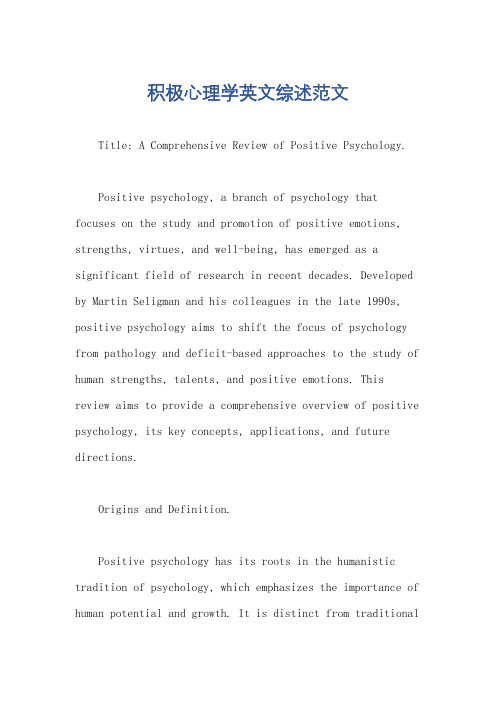
积极心理学英文综述范文Title: A Comprehensive Review of Positive Psychology.Positive psychology, a branch of psychology that focuses on the study and promotion of positive emotions, strengths, virtues, and well-being, has emerged as a significant field of research in recent decades. Developed by Martin Seligman and his colleagues in the late 1990s, positive psychology aims to shift the focus of psychology from pathology and deficit-based approaches to the study of human strengths, talents, and positive emotions. This review aims to provide a comprehensive overview of positive psychology, its key concepts, applications, and future directions.Origins and Definition.Positive psychology has its roots in the humanistic tradition of psychology, which emphasizes the importance of human potential and growth. It is distinct from traditionalpsychology, which has often been focused on studying and treating mental illness and pathology. Positive psychology instead focuses on the positive aspects of human life, including emotions, traits, and institutions that promote well-being and flourishing.The core principles of positive psychology are centered around three key areas: positive emotions, engagement with life, and positive relationships. Positive emotions refer to feelings of happiness, joy, contentment, and other positive affective states. Engagement with life involves being fully present and immersed in activities that are personally meaningful and fulfilling. Positiverelationships refer to the quality and nature of our social connections with others, including family, friends, and community.Applications and Interventions.Positive psychology has a wide range of applications and interventions that aim to promote positive outcomes and enhance well-being. One of the most well-knowninterventions in positive psychology is the practice of gratitude, which involves intentionally focusing on and appreciating the good things in life. Gratitude has been shown to improve emotional well-being,增强人际关系, and enhance overall life satisfaction.Other interventions include mindfulness practices, such as meditation and yoga, which promote awareness and engagement with the present moment. Mindfulness has been found to reduce stress and anxiety, enhance emotional regulation, and improve cognitive performance. Other positive psychology interventions focus on building social connections, fostering positive relationships, and developing character strengths.Future Directions.Positive psychology is a rapidly growing field, and there are many exciting directions for future research and application. One area of particular interest is the development of positive interventions for specific populations, such as adolescents, older adults, andindividuals with mental health conditions. By tailoring interventions to meet the unique needs of these populations, positive psychology has the potential to make significant contributions to improving their well-being and quality of life.Another important direction for future research is the exploration of the neurobiological mechanisms that underlie positive emotions and well-being. By understanding how positive psychology interventions work at theneurobiological level, we can gain a deeper understandingof their effectiveness and develop more targeted andprecise interventions.Conclusion.Positive psychology has emerged as a critical field of research and practice that focuses on the positive aspectsof human life. By studying and promoting positive emotions, strengths, virtues, and well-being, positive psychology has the potential to transform individuals, communities, and society for the better. Future research and applications inpositive psychology will continue to expand our understanding of human potential and growth and lead to more effective interventions that promote positive outcomes and enhance well-being.。
积极心理学 品格优势 英文

积极心理学品格优势英文Positive psychology is a branch of psychology that focuses on understanding and promoting human well-being and flourishing. It emphasizes the study of positive emotions, character strengths, and positive experiences. One key concept within positive psychology is the notion of character strengths.Character strengths refer to positive traits or qualities that are inherent to individuals and contribute to their personal and social well-being. These strengths are considered to be the core elements of a person's character and are believed to play a crucial role in their overall happiness and success.There are several theories and models that have been developed to identify and classify character strengths. One of the most well-known models is the Values in Action (VIA) classification, which identifies 24 character strengths. Some examples of these strengths include creativity, kindness, perseverance, and gratitude.Research in positive psychology has shown that individuals who are aware of their character strengths and actively utilize them in their daily lives experience higher levels ofwell-being, happiness, and life satisfaction. For example, individuals who frequently express gratitude tend to have a more positive outlook on life and stronger social relationships.Character strengths can be developed and cultivated through various interventions and practices. One such intervention is the practice of mindfulness, which involves intentionally paying attention to the present moment without judgment. Mindfulness has been found to enhance self-awareness and help individuals recognize and utilize their character strengths effectively.In addition to mindfulness, other interventions such as positive affirmations, gratitude exercises, and acts of kindness can also be used to promote the development and utilization of character strengths. These interventions have been shown to improve overall well-being and contribute to a more positive and fulfilling life.To sum up, positive psychology and the concept of character strengths provide a framework for understanding and promoting human flourishing. By focusing on individuals' positive qualities and strengths, positive psychology offers practical strategies for enhancing well-being and living a morefulfilling life.积极心理学是心理学的一个分支,专注于理解和促进人类的幸福和繁荣。
积极心理学英文综述范文
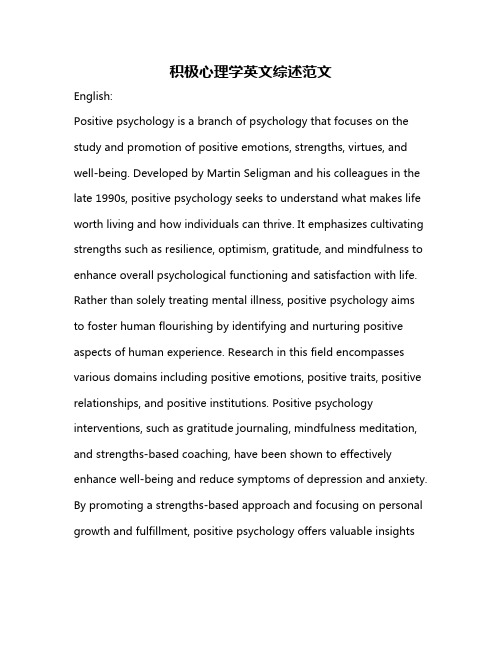
积极心理学英文综述范文English:Positive psychology is a branch of psychology that focuses on the study and promotion of positive emotions, strengths, virtues, and well-being. Developed by Martin Seligman and his colleagues in the late 1990s, positive psychology seeks to understand what makes life worth living and how individuals can thrive. It emphasizes cultivating strengths such as resilience, optimism, gratitude, and mindfulness to enhance overall psychological functioning and satisfaction with life. Rather than solely treating mental illness, positive psychology aims to foster human flourishing by identifying and nurturing positive aspects of human experience. Research in this field encompasses various domains including positive emotions, positive traits, positive relationships, and positive institutions. Positive psychology interventions, such as gratitude journaling, mindfulness meditation, and strengths-based coaching, have been shown to effectively enhance well-being and reduce symptoms of depression and anxiety. By promoting a strengths-based approach and focusing on personal growth and fulfillment, positive psychology offers valuable insightsinto enhancing the quality of life and promoting resilience in individuals and communities.中文翻译:积极心理学是心理学的一个分支,专注于研究和促进积极情绪、优势、美德和幸福感。
传递积极心理信念英文作文
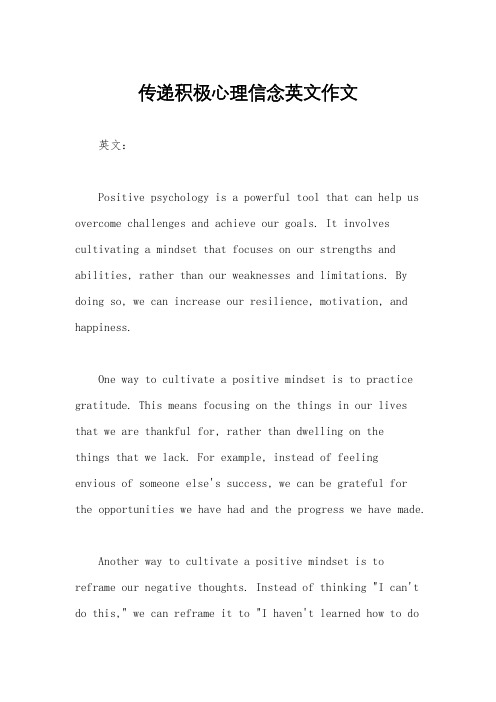
传递积极心理信念英文作文英文:Positive psychology is a powerful tool that can help us overcome challenges and achieve our goals. It involves cultivating a mindset that focuses on our strengths and abilities, rather than our weaknesses and limitations. By doing so, we can increase our resilience, motivation, and happiness.One way to cultivate a positive mindset is to practice gratitude. This means focusing on the things in our lives that we are thankful for, rather than dwelling on thethings that we lack. For example, instead of feelingenvious of someone else's success, we can be grateful forthe opportunities we have had and the progress we have made.Another way to cultivate a positive mindset is to reframe our negative thoughts. Instead of thinking "I can't do this," we can reframe it to "I haven't learned how to dothis yet, but I can learn." This helps us to see challenges as opportunities for growth and learning, rather than as insurmountable obstacles.Finally, it is important to surround ourselves with positive influences. This can include supportive friends and family members, inspiring role models, and uplifting media. By surrounding ourselves with positivity, we can reinforce our own positive mindset and stay motivated to achieve our goals.中文:积极心理学是一种强大的工具,可以帮助我们克服挑战,实现目标。
积极心理品质英文

积极心理品质英文Positive Psychological QualitiesEmbracing a positive mindset is a fundamental aspect of personal growth and well-being. Cultivating positive psychological qualities can have a profound impact on our lives, enabling us to navigate challenges, foster meaningful relationships, and unlock our full potential. In this essay, we will explore some of the key positive psychological qualities and their significance in our personal and professional lives.One of the most essential positive psychological qualities is resilience. Resilience is the ability to bounce back from adversity, adapt to change, and overcome obstacles. Individuals with a high level of resilience possess an innate ability to cope with stress, learn from setbacks, and maintain a positive outlook even in the face of adversity. Resilience is not about avoiding or eliminating challenges but rather about developing the skills and mindset to navigate them effectively. By fostering resilience, we can develop a greater capacity to withstand life's ups and downs, and emerge from difficult situations stronger and more equipped to tackle future challenges.Another crucial positive psychological quality is optimism. Optimism is the tendency to expect positive outcomes and focus on the brighter side of life. Optimistic individuals are more likely to see opportunities rather than obstacles, and are more inclined to take action towards their goals. Optimism has been linked to a range of positive outcomes, including better physical and mental health, stronger relationships, and increased perseverance in the face of challenges. By cultivating an optimistic mindset, we can enhance our overall well-being, boost our motivation, and approach life's challenges with a sense of hope and possibility.Closely related to optimism is the quality of hope. Hope is the belief that positive change is possible and that we have the ability to influence our own future. Individuals with a strong sense of hope are more likely to set and pursue meaningful goals, and to maintain a positive outlook even in the face of setbacks. Hope is a powerful force that can inspire us to take action, overcome obstacles, and ultimately achieve our desired outcomes. By fostering hope, we can develop a greater sense of agency and control over our lives, and approach the future with a sense of purpose and determination.Another important positive psychological quality is gratitude. Gratitude is the practice of acknowledging and appreciating the positive aspects of our lives, including the people, experiences, and opportunities we have been blessed with. Individuals who cultivategratitude tend to have a more positive outlook on life, experience higher levels of life satisfaction, and develop stronger social connections. Expressing gratitude can also have a profound impact on our mental and physical health, as it has been linked to reduced stress, improved sleep, and increased feelings of well-being. By regularly practicing gratitude, we can shift our focus away from what we lack and instead appreciate the abundance that already exists in our lives.Closely related to gratitude is the quality of mindfulness. Mindfulness is the practice of being fully present and engaged in the current moment, without judgment or attachment to the past or future. Mindful individuals are better equipped to manage stress, regulate their emotions, and maintain a clear and focused mind. Mindfulness has been shown to enhance cognitive function, improve decision-making, and foster a greater sense of overall well-being. By cultivating mindfulness, we can develop a greater awareness of our thoughts, feelings, and behaviors, and respond to life's challenges with greater clarity and equanimity.Another positive psychological quality that is crucial for personal growth and success is self-compassion. Self-compassion is the ability to treat oneself with kindness, understanding, and acceptance, even in the face of failure or perceived shortcomings. Individuals who practice self-compassion are less likely to engage in self-criticismand more likely to approach challenges with a nurturing and supportive attitude. Self-compassion has been linked to a range of positive outcomes, including improved mental health, stronger relationships, and greater resilience in the face of adversity. By cultivating self-compassion, we can develop a more positive and supportive relationship with ourselves, which can in turn enhance our overall well-being and ability to navigate life's challenges.Finally, one of the most important positive psychological qualities is a sense of purpose. A sense of purpose is the belief that our lives have meaning and that we are working towards something greater than ourselves. Individuals with a strong sense of purpose tend to have a greater sense of direction, motivation, and overall life satisfaction. Purpose can be found in a wide range of domains, from our work and hobbies to our relationships and community involvement. By cultivating a sense of purpose, we can develop a greater sense of meaning and fulfillment in our lives, and approach our goals and aspirations with a greater sense of passion and commitment.In conclusion, the cultivation of positive psychological qualities is essential for personal growth, well-being, and success. By embracing qualities such as resilience, optimism, hope, gratitude, mindfulness, self-compassion, and a sense of purpose, we can develop a more positive and empowered mindset that enables us to navigate life'schallenges with greater ease and effectiveness. Through the consistent practice and development of these qualities, we can unlock our full potential, deepen our relationships, and contribute positively to the world around us.。
The Psychology of Positive Psychology
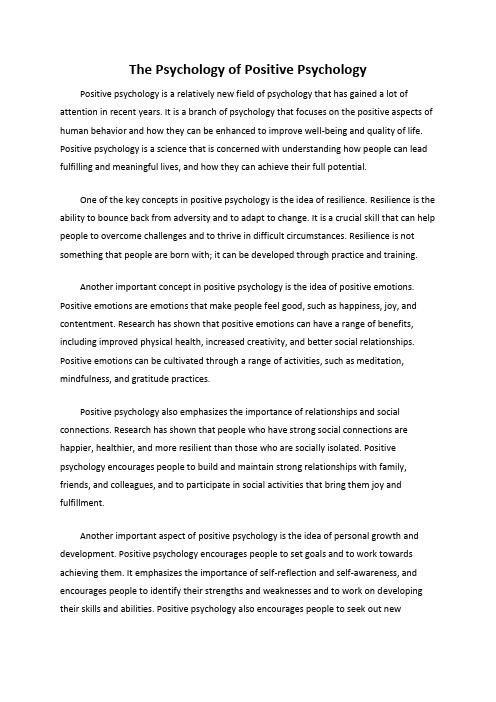
The Psychology of Positive Psychology Positive psychology is a relatively new field of psychology that has gained a lot of attention in recent years. It is a branch of psychology that focuses on the positive aspects of human behavior and how they can be enhanced to improve well-being and quality of life. Positive psychology is a science that is concerned with understanding how people can lead fulfilling and meaningful lives, and how they can achieve their full potential.One of the key concepts in positive psychology is the idea of resilience. Resilience is the ability to bounce back from adversity and to adapt to change. It is a crucial skill that can help people to overcome challenges and to thrive in difficult circumstances. Resilience is not something that people are born with; it can be developed through practice and training.Another important concept in positive psychology is the idea of positive emotions. Positive emotions are emotions that make people feel good, such as happiness, joy, and contentment. Research has shown that positive emotions can have a range of benefits, including improved physical health, increased creativity, and better social relationships. Positive emotions can be cultivated through a range of activities, such as meditation, mindfulness, and gratitude practices.Positive psychology also emphasizes the importance of relationships and social connections. Research has shown that people who have strong social connections are happier, healthier, and more resilient than those who are socially isolated. Positive psychology encourages people to build and maintain strong relationships with family, friends, and colleagues, and to participate in social activities that bring them joy and fulfillment.Another important aspect of positive psychology is the idea of personal growth and development. Positive psychology encourages people to set goals and to work towards achieving them. It emphasizes the importance of self-reflection and self-awareness, and encourages people to identify their strengths and weaknesses and to work on developing their skills and abilities. Positive psychology also encourages people to seek out newexperiences and challenges, and to embrace opportunities for personal growth and development.Finally, positive psychology emphasizes the importance of meaning and purpose in life. Research has shown that people who have a sense of meaning and purpose in life are happier, healthier, and more resilient than those who do not. Positive psychology encourages people to identify their values and to work towards goals that are aligned with those values. It also encourages people to find meaning and purpose in their work, their relationships, and their hobbies and interests.In conclusion, positive psychology is a fascinating and important field of psychology that has a lot to offer in terms of improving well-being and quality of life. It emphasizes the importance of resilience, positive emotions, relationships, personal growth and development, and meaning and purpose in life. By focusing on these key concepts, positive psychology can help people to lead happier, healthier, and more fulfilling lives.。
积极心理学英语作文
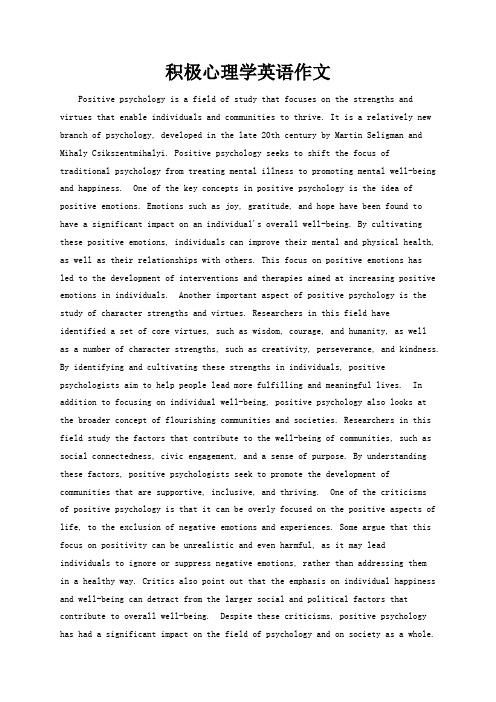
积极心理学英语作文Positive psychology is a field of study that focuses on the strengths and virtues that enable individuals and communities to thrive. It is a relatively new branch of psychology, developed in the late 20th century by Martin Seligman and Mihaly Csikszentmihalyi. Positive psychology seeks to shift the focus oftraditional psychology from treating mental illness to promoting mental well-being and happiness. One of the key concepts in positive psychology is the idea of positive emotions. Emotions such as joy, gratitude, and hope have been found to have a significant impact on an individual's overall well-being. By cultivating these positive emotions, individuals can improve their mental and physical health, as well as their relationships with others. This focus on positive emotions hasled to the development of interventions and therapies aimed at increasing positive emotions in individuals. Another important aspect of positive psychology is the study of character strengths and virtues. Researchers in this field haveidentified a set of core virtues, such as wisdom, courage, and humanity, as wellas a number of character strengths, such as creativity, perseverance, and kindness. By identifying and cultivating these strengths in individuals, positive psychologists aim to help people lead more fulfilling and meaningful lives. In addition to focusing on individual well-being, positive psychology also looks at the broader concept of flourishing communities and societies. Researchers in this field study the factors that contribute to the well-being of communities, such as social connectedness, civic engagement, and a sense of purpose. By understanding these factors, positive psychologists seek to promote the development of communities that are supportive, inclusive, and thriving. One of the criticismsof positive psychology is that it can be overly focused on the positive aspects of life, to the exclusion of negative emotions and experiences. Some argue that this focus on positivity can be unrealistic and even harmful, as it may leadindividuals to ignore or suppress negative emotions, rather than addressing themin a healthy way. Critics also point out that the emphasis on individual happiness and well-being can detract from the larger social and political factors that contribute to overall well-being. Despite these criticisms, positive psychology has had a significant impact on the field of psychology and on society as a whole.It has led to the development of interventions and therapies that have been shown to improve mental health and well-being, and it has sparked a broader cultural conversation about the importance of happiness and flourishing. By focusing on the positive aspects of human experience, positive psychology has the potential to help individuals, communities, and societies thrive.。
积极心理学1504-01-入门介绍
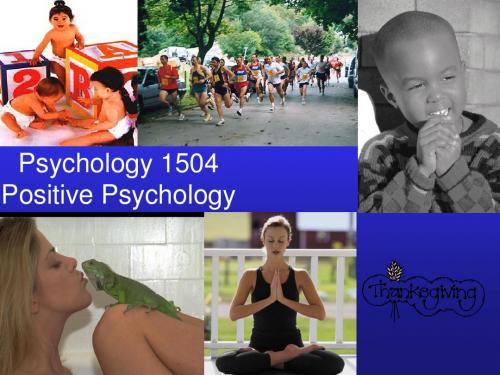
The Road to Positive Psychology
• Humanistic Psychology (50‘s)
• The Third Force
– Reaction to behaviorism (First Force) – Reaction to psychoanalysis (Second Force)
Abraham Maslow
Psychology Needs Help
• 21/1 ratio is unhealthy… • … but it reflects reality
– depression 10 times higher today than 1960 – mean age for depression today is 14.5 (compared to 29.5 in 1960)
―The most common source of mistakes in management decisions is the emphasis on finding the right answer rather than the right question.‖ Peter Drucker
Abraham Maslow
It is not about providing definitive answers concerning the good life It is about identifying the right questions
Education is the quest for information and transformation, and therefore must begin with a question.
积极心理学定义外文翻译(可编辑)

积极心理学定义外文翻译(可编辑)积极心理学定义外文翻译外文翻译原文Positive Psychology DefinedMaterial Source: Journal of psychology and christianityAuthor: Siang-yang TanSeveral years ago, the millennial issue of the American Psychologist focused on the emerging science of positive psychology, referring to the study of positive emotion, positive character, and positive institutions. In that issue, Seligman and Csikszentmihalyi 2000 defined positive psychology thus:The field of positive psychology at the subjective level is about valued subjective experiences: well-being,contentment, and satisfaction in the past; hope and optimism for the future; and flow and happiness in the present. At the individual level,it is about positive individual traits:the capacity for love and vocation,courage, interpersonal skill, aesthetic sensibility, perserverance, forgiveness, originality, future-mindedness,spirituality, high talent, and wisdom.At the group level, it is about the civic virtues and the institutions that move individuals toward better citizenship: responsibility,nurturance,altruism, civility, moderation, tolerance, and work ethic, p. 5Progress of Positive PsychologyMore recently, also in the American Psychologist, Seligman, Steen, Park, and Peterson 2005 provided a progress report on positive psychology, including some empirical validation of interventions. They noted that in the 5 years since 2000, a number of significant books have been published on positive psychology, such as: The Handbook of Positive Psychology Snyder &Lopez, 2002; Authentic Happiness Seligman,2002a; A Psychology of Human Strengths: Fundamental Questions and Future Directions for a Positive Psychology Aspinwall & Staudinger,2003; Flourishing: Positive Psychology and the Life Well Lived Keyes & Haidt, 2003; Positive Psychological Assessment: A Handbook of Mode and Measures Lopez & Snyder, 2004 covering measures of hope, optimism, self-efficacy, problem-solving, locus of control, creativity, wisdom, courage, positive emotion, self-esteem, love,emotional intelligence, empathy, attachment, for-giveness, humor, gratitude, faith, morality, coping, well-being, and quality of life; Positive Psychology in Practice Linley & Joseph,2004bcontaining many helpful guidelines and suggestions for putting positive psychology into practice; Character Strengths and Virtues: A Handbook and Classification Peterson & Seligman, 2004; and Handbook of Methods in Positive Psychology Ong & van Dulmen, in press.Seligman et al. 2005 also noted that there are significant developments in the field of positive psychology in terms of meetings e.g., the Annual International Positive Psychology Summit is held the first weekend of October in Washington, DC, networks and centers e.g.,the Positive Psychology Network supports more than 50 research groups totaling more than 150 scientists from universities around the world,and the first Positive Psychology Centers in the United States at the University of Pennsylvania, the University of Michigan, the Universityof Illinois, and Claremont Graduate University, courses and degrees e.g., the first master's degree in applied positive psychology at theUniversity of Pennsylvania started in September, 2003,andwebsitese.g.,//0>./science/positivepsy.6>html,//./. Furthermore,a new quarterly journal. The Journal of Positive Psychology, will be launched and published by Taylor and Francis Publishers in 2006.Positive Virtues and Character StrengthsThe field or movement of positive psychology has therefore grown tremendously in a few short years. Seligman et al. 2005 especially emphasized and summarized the following classification of 6 virtues and 24 character strengths described in more detail in Peterson and Seligman 2004: 1 Wisdom and knowledge creativity, curiosity, open-mindedness,love of learning, perspective; 2 Courage authenticity,bravery,persistence, zest; 3 Humanity kindness, love. Social intelligence; 4Justicefairness,leadership,teamwork;5Temperanceforgiveness,modesty,p rudence, self-regulation; 6 Transcendence appreciation of beauty and excellence, gratitude, hope, humor, religiousness.Positive psychology's focus on such virtues and character strengths actually overlaps muchwith what the field of the psychology of religion has been studying andresearching for many years.Park 2003 therefore pointed out the need for positive psychology to be more aware of the psychology of religion and access more the contributions of the psychology of religion already available on some of the subject matter of positive psychology e.g., see Paloutzian & Park,2005. She emphasized, in particular, research that has been done in the psychology of religion on meaning in life and stress-related growthalso see Ryff & Singer, 2003, on resilience or flourishing under fire.With regard to stress-related growth. Park2003 reported that religiousness has been found to be related to growth in individuals experiencing a variety of stressful life events such as bereavement, hospitalization, having cancer, sexual assault, bringing up an autistic child, and testing positive for HIV. She also challenged researchers involved in the psychology of religion to relate their work and findings more to the rapidly growing field or movement of positive psychology. Positive psychology is therefore not without its critics and critiques e.g., see Held, 2004; also see Aspinwall & Staudinger,2003; Park, 2003;and Sandage & Hill, 2001. A biblical perspective on and critique of positive psychology will be briefly covered toward the end of this article.Applied Positive Psychology: Positive Prevention and Positive TherapySeligman 2002b has briefly described how positive psychology can be applied to prevention positive prevention and therapy positive therapy.In positive prevention he notes that the following human strengths, to name several,have been found to act as buffers against mental illness: courage, future-mindedness, optimism,interpersonal skill, faith, work ethic, hope, honesty, perseverance, the capacity for flow and insight. Positive prevention seeks to understand and learn how to develop and strengthen these virtues in young people. For example Seligman described the use of disputing of catastrophic thinking as a core skill in "learned optimism"programs that he has developed and found effective in preventing depression and anxiety in children and adults. He advocates identifying and developing or building positive human traits orstrengths in people at risk, so that effective prevention can occurusing a positive psychology approach: positive prevention.In positive therapy or using a positive psychology approach to the treatment of psychological or mental disorders, Seligman 2002b remindsus that there are some clear specifics in effective psy chotherapy, such as "applied tension for blood and injury phobia, penile squeeze for premature ejaculation, cognitive therapy for panic, relaxation for phobia, exposure for obsessive-compulsive disorder, behavior therapy for enuresis" p. 6. With regard to the so-called nonspecifics of effective psychotherapy, he proposed renaming them into two main classes or categories: tactics and deep strategies.Seligman 2002b listed the following as examples of tactics of good psychotherapy: "attention, authority figure, rapport, paying for services, trust, opening up, naming the problem, tricks of the tradee.g., "Let's pause here," rather than "Let's stop here"" p. 6. With regard to deep strategies, he believes that they are all techniques of positive psychology, and include instilling hope, narration or telling the stories of our lives, and the "building of buffering strengths" pg.6. Examples of strengths built in effective psychotherapy or positive psychotherapy are: "courage, interpersonal skill, rationality, insight, optimism, honesty, perseverance, realism, capacity for pleasure, putting troubles into perspective,future-mindedness, finding purpose" p.7.Seligman 2002b therefore emphasizes that a positive psychology approach to prevention and therapy---- positie prevention and positive therapy----will measure, understand and build the positive human traits or characteristics virtues and character strengths that make life worth living and that help individuals and communities not just survive or endure but also flourish.FlourishingRecently, there has been a greater emphasis on flourishing, focusing on good mental health and the life well lived rather than just on the absence of mental illness. Keyes and Haidt 2003 have edited a book on flourishing, referring to when people experience high levels of emotional, psychological and social well-being due to vigor and vitality, self-determination, continuous self-growth, close relationships and a meaningful and purposeful life see Tracey, 2005. Keyes 2005found in recent research with a nationally representative sample of adults age 25 to 74 years A^ 3,032 that only 18% of American adults met his criteriafor the categorical diagnosis of "flourishing." The majority of adults roughly 6 in 10 or 65.1% were in the "moderately mentally healthy"categorical diagnosis. About 17% of adults were found to be in the categorical diagnosis of "languishing" or mentally unhealthy. Nearly as many American adults were therefore found to be languishing 16.9% or rnentally unhealthy as were found to be flourishing 18% or mentally healthy. Keyes concluded that mental health is clearly a positive thing, and anything less than flourishing seems to fall short of healthy functioning in life since diagnoses less than flourishing wereassociated with higher levels of dysfunctions in terms of work reductions, health limitations, and psychosocial functioning.In a similarvein, Frederickson and Losada 2005 recently described positive affect and the complex dynamics of human flourishing. Based on Frederickson's 1998 broaden-and-build theory of positive emotions and Losada's 1999 non-linear dynamics model of team performance, they predicted that a ratio of positive to negative affect at or above 2.9will characterize individuals classified as in flourishing mental health. They conducted a study with two samples of university students totaling 188 participants who completed an initial survey to identify flourishing mental health, and then kept daily reports of experienced positive and negative emotions for 28 days. They found that the mean ratio ofpositive to negative affect was above 2.9 for those classified as flourishing and below 2.9 for those classified as not flourishing, andfelt that this discovery of the critical 2.9 positivity ratio may be a breakthrough.Frederickson and Losada 2005 also suggest that appropriatenegativity is a crucial ingredient within human flourishing that helps to maintain a grounded system, pointing out that the complex dynamics of flourishing may first show signs of disintegration at a positivity ratio of 11.6.They therefore propose the following prediction:Human flourishing is optimal functioning characterized by four key components: a goodness, indexed by happiness, satisfaction, and superior functioning; b generativity. indexed by broadened thought-action repertoires and behavioral flexibility;c growth, indexed by gains in enduring personal and social resources; and d resilience, indexed by survival and growth in the after-math of adversity. Each of these four components will be linked to positivity ratios at or above 2.9. p. 685 Empirical Validation of Positive Psychology Interventions toIncrease Individual HappinessSeligman et al. 2005 also reported the results of their most recent research efforts at empirically validating or supporting the efficacy of several positive psychology interventions aimed at increasing individual happiness. They first point out the need to better define happiness as a term consisting of at least the following three distinct aspects or dimensions Seligman, 2002a: "a positive emotion and pleasure the pleasant life; b engagement the engaged life; and cmeaning themeaningful life" p. 413. Their recent research has shown that the most satisfied people are those who pursue all three, with engagement and meaning carrying the most weight Peterson, Park, & Seligman, 2005.Seligman et al. 2005 conducted their first large randomizedcontrolled trial RCT using the random-assignment, placebo-controlled design on the efficacy of five internet-based happiness exercises and one placebo control exercise, with a convenience sample drawn from visitors to the web site created for Seligman's 2002a book Authentic Happiness. The initial sample consisted of 577 participants who completed baselinequestionnaires, including a measure of depression called the Center for Epidemiological Studies-Depression Scale or CES-D Radloff, 1977, and a new measure of happiness called the Steen Happiness Index or SHI that they developed. The final sample they used consisted of 41171%participants who completed all five follow-up assessments after the pre-test, immediate post-test after one week of intervention, 1 week follow-up, 1 month follow-up, 3 month follow-up and 6 month follow-up. The placebo control exercise was writing about early memories every night for one week Farly memories. The 5 happiness exercises were: 1 Gratitude visit participants were given a week to write a letter of gratitude and then deliver it personally to someone who had been especially kind to them but had not yet been appropriately thanked;2Three good things in life participants were asked to write down three things that went well and their causes daily for a week; 3 You at yourbest participants were asked to write about a period in their lives when they were at their best and to reflect on the strengths they had identified, and to review this daily for a week; 4Using signature strengths in a new way participants were given feedback on their topfive or"signature" strengths based on an inventory of character strengths they were asked to take online, and to use one of these top strengths in a different and new way daily for a week; 5Identifying signature strengths participants were asked to take the inventory of character strengths online, note theirfive top strengths, and use them more often for a week.Seligman et al. 2005 found in this Internet RCT that two of the happiness exercises or interventions using signature strengths in a new way and three good things increased happiness and reduced depressive symptoms for six months. Another happiness exercise, the gratitude visit resulted in large positive changes but only for a month. The other two happiness exercises yow at your best and identifying signature strengths and the placebo control (early memories' led to positive but temporary or transient effects on happiness and depressive symptoms. The long-term effects of the effective happiness exercises were greatest for the participants who continued the exercises on their own beyond the prescribed one week period of intervention.There are, of course, methodological limitations with such anInternet-based RCT, such as using a convenience sample with largely white, well-educated and financially comfortable participants who wereonly mildly depressed and interested in becoming happier. However, current studies being conducted by Seligman and his colleagues using packages of happiness exercises rather than isolated exercises delivered with human hands rather than through the Internet are showing large effect sizes for reducing depression and increasing happiness compared to the moderate effect sizes they found in this initial Internet-based study Seligman et al., 2005. Seligman et al. therefore concluded: We cannot resist thespeculation that happiness exercises may prove therapeutic in depressive "disorders. It is important to note that these interventions also reduced depressive symptoms lastingly, and in other studies we are finding that this effect is massive. In fact, an unspoken premise of all talk therapy is that it is beneficial to talk about one's troubles and to overcome them by confronting them。
- 1、下载文档前请自行甄别文档内容的完整性,平台不提供额外的编辑、内容补充、找答案等附加服务。
- 2、"仅部分预览"的文档,不可在线预览部分如存在完整性等问题,可反馈申请退款(可完整预览的文档不适用该条件!)。
- 3、如文档侵犯您的权益,请联系客服反馈,我们会尽快为您处理(人工客服工作时间:9:00-18:30)。
The original of positive psychology must date back to the humanistic psychology in the 20th century, which focused heavily on happiness and fulfillment. (As scientific psychology did not take its modern form until the late 19th century) Philosophy and religious sources have influence on positivity. Socrates advocated self-knowledge as the path to happiness. Plato believed that happiness is found by finding deeper meaning. Aristotle had the idea that happiness is constituted by rational activity in accordance with virtue over a complete life. The first positive psychology summit and the First International Conference on Positive Psychology took place in 1999 and in 2002. Since then, more attention was given by the general public
As a positive branch of psychology, the definition of positive psychology is make psychology investigate and promote realistic ways of fostering more joy in individuals and communities. Its purpose is to achieve a scientific understanding and effective interventions, building thriving individuals, families, and communities and making normal life more fulfilling, rather than merely treating mental illness.Positive psychology is primarily concerned with using the psychological theory, research and intervention techniques to understand the positive, adaptive, creative and emotionally fulfilling aspects of human behavior. Its goal is to help people change negative styles of thinking as a way to change how they feel. Positive psychologists are concerned with four topics: (1) positive experiences, (2) enduring psychological traits, (3) positive relationships and (4) positive institutions. [8]
In positive psychology, there are many factors involve in happiness, such as age, gender, personal finances, education, intelligence, parenthood, marriage, personality, social ties, weather, religion culture, political views and suffering.
It helps people complete mental health which is a combination of high emotional well-being, high psychological well-being, and high social well-being, along with low mental illness. Using your signature strengths every day to produce authentic happiness and abundant gratification is a kind of positive thinking mentioned in the positive psychology.
Overall general, positive psychology creates a bridge between Ivory and main street, contributing a well-lived and fulfilling life.。
